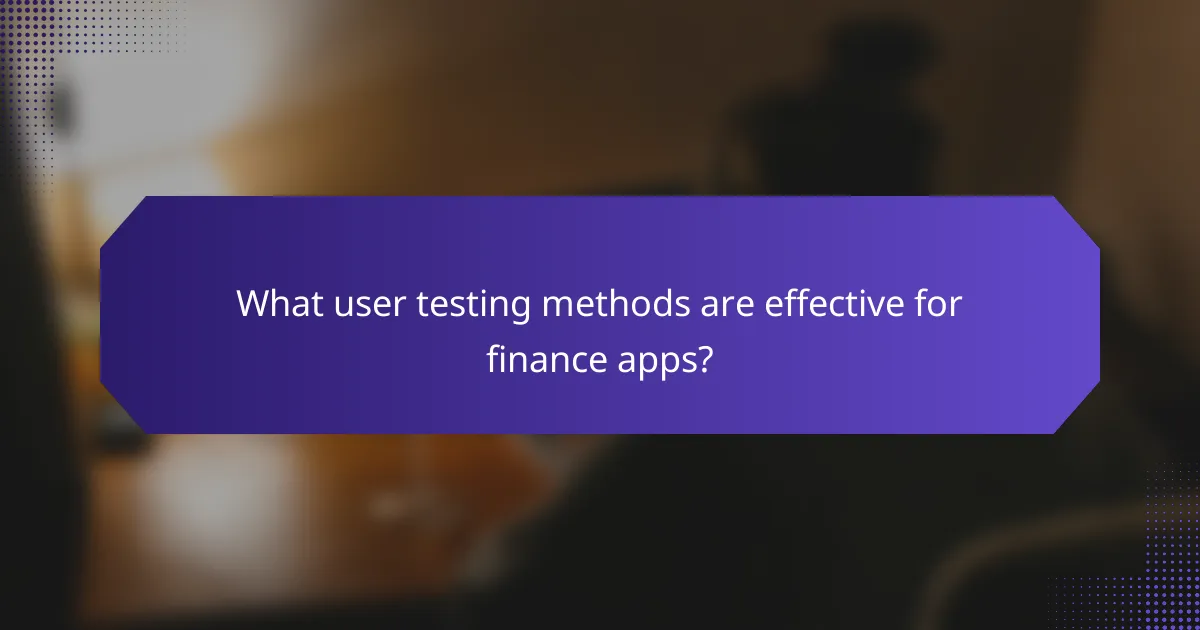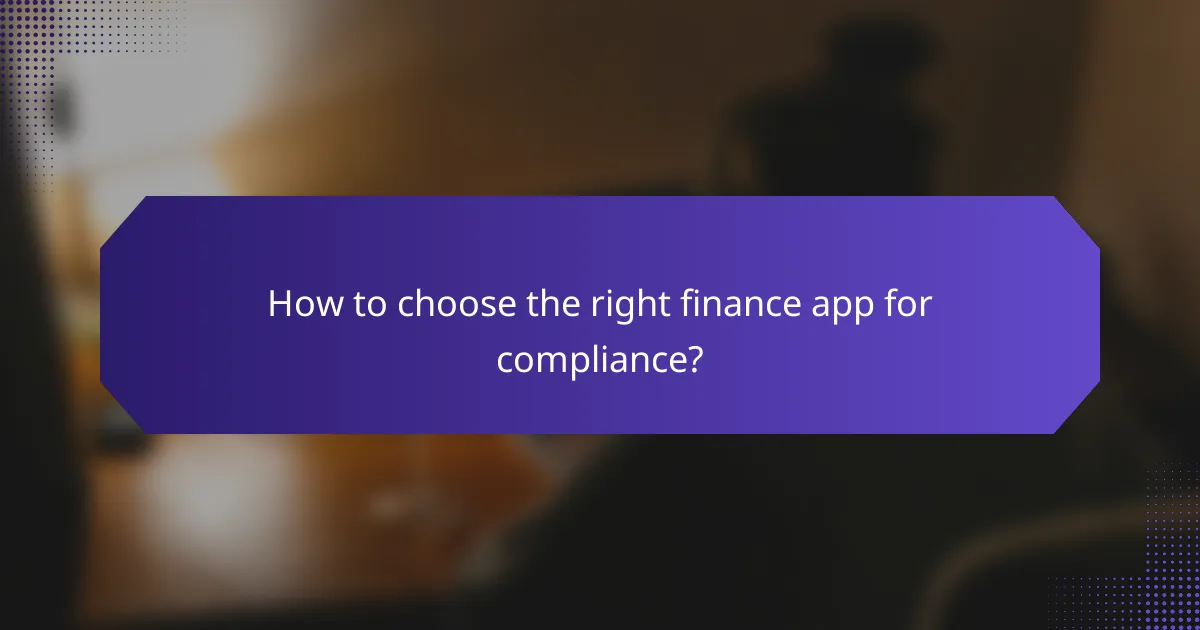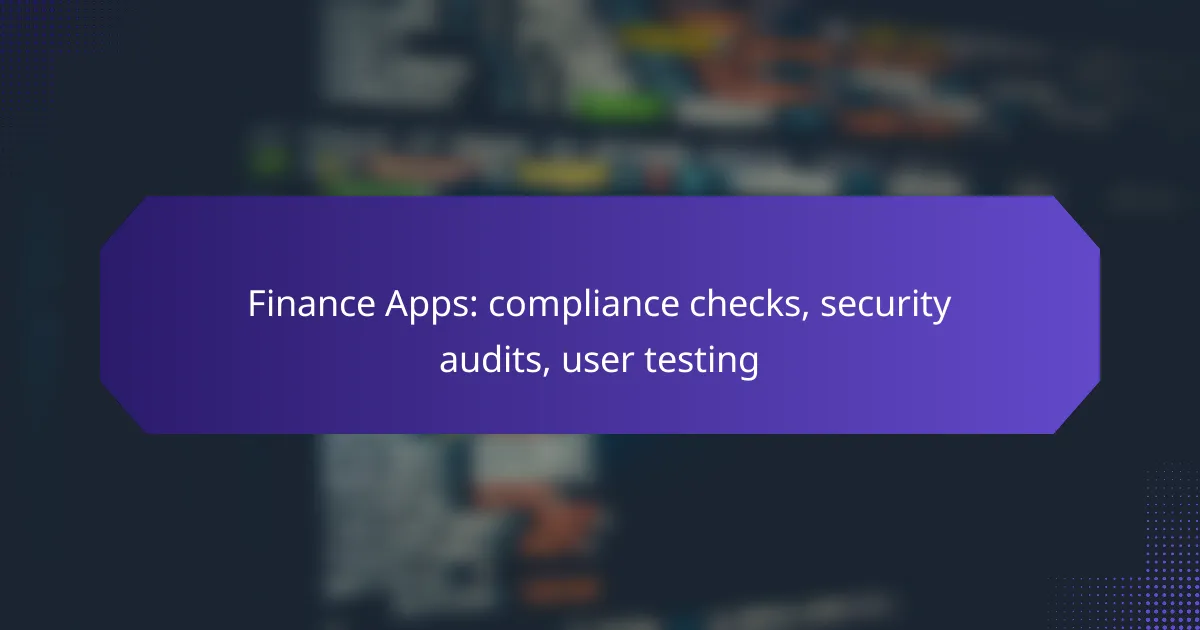Finance apps play a crucial role in ensuring compliance with regulatory standards, conducting security audits, and facilitating effective user testing. By streamlining compliance checks, these applications help businesses navigate complex financial regulations while safeguarding user data through rigorous security measures. Additionally, user testing methodologies ensure that these apps not only meet regulatory requirements but also provide a seamless experience for users.

What are the best finance apps for compliance checks in the UK?
The best finance apps for compliance checks in the UK streamline regulatory processes, ensuring adherence to local laws and standards. These applications help businesses manage risk, verify identities, and maintain compliance with financial regulations efficiently.
ComplyAdvantage
ComplyAdvantage offers real-time risk data and compliance solutions tailored for financial institutions. It utilizes advanced machine learning to monitor transactions and identify potential risks, helping businesses stay compliant with UK regulations.
Key features include automated screening against global sanctions lists and continuous monitoring of customer transactions. This can significantly reduce the time spent on manual compliance checks and enhance overall security.
Trulioo
Trulioo specializes in identity verification, providing a robust platform for compliance checks. It enables businesses to verify customer identities across multiple jurisdictions, including the UK, ensuring compliance with Know Your Customer (KYC) regulations.
With access to over 5 billion identities worldwide, Trulioo helps organizations streamline their onboarding processes while minimizing the risk of fraud. Its user-friendly interface allows for quick integration into existing systems.
LexisNexis Risk Solutions
LexisNexis Risk Solutions provides comprehensive compliance and risk management tools designed for the financial sector. Their solutions help businesses assess risk and comply with regulations by offering insights into customer behavior and transaction patterns.
Utilizing a vast database, LexisNexis enables organizations to perform thorough background checks and monitor ongoing compliance. This ensures that businesses can effectively manage their compliance obligations while reducing exposure to potential risks.

How do finance apps conduct security audits?
Finance apps conduct security audits through a combination of automated assessments, third-party certifications, and penetration testing. These methods ensure that the apps comply with industry standards and protect user data effectively.
Automated security assessments
Automated security assessments utilize software tools to scan finance apps for vulnerabilities and compliance issues. These tools can quickly identify common security flaws, such as outdated libraries or misconfigurations, allowing developers to address them promptly.
Regular automated assessments are essential, as they can be scheduled frequently and provide a baseline for security posture. However, they should be complemented by manual reviews to catch more complex vulnerabilities that automated tools might miss.
Third-party security certifications
Obtaining third-party security certifications, such as ISO 27001 or SOC 2, demonstrates a finance app’s commitment to security best practices. These certifications require rigorous audits by independent organizations, ensuring that the app meets specific security standards.
While certifications can enhance user trust and marketability, they often involve significant time and financial investment. Companies should weigh the benefits of certification against their operational needs and user expectations.
Penetration testing services
Penetration testing services involve ethical hackers simulating attacks on finance apps to identify vulnerabilities before malicious actors can exploit them. These tests provide a realistic assessment of the app’s security and help prioritize remediation efforts.
Engaging penetration testing services periodically, especially after major updates or changes, is crucial. Organizations should choose reputable firms with experience in finance app security to ensure comprehensive evaluations and actionable insights.

What user testing methods are effective for finance apps?
Effective user testing methods for finance apps include usability testing sessions, A/B testing frameworks, and feedback surveys. These approaches help ensure that the app meets user needs while maintaining compliance and security standards.
Usability testing sessions
Usability testing sessions involve observing real users as they interact with the finance app. This method helps identify pain points and areas for improvement by watching users complete specific tasks, such as making a transaction or navigating account settings.
When conducting usability tests, aim for a diverse group of participants that reflects your target audience. Sessions can last from 30 minutes to an hour, and it’s beneficial to record the sessions for later analysis.
A/B testing frameworks
A/B testing frameworks allow you to compare two versions of a feature or interface to determine which performs better. For finance apps, this could involve testing different layouts for transaction summaries or varying the wording on call-to-action buttons.
To implement A/B testing effectively, ensure that you have a clear hypothesis and sufficient traffic to achieve statistically significant results. Aim for a testing period of at least a few weeks to gather enough data for reliable conclusions.
Feedback surveys
Feedback surveys are a straightforward way to gather user opinions about your finance app. These surveys can be distributed via email or within the app itself, asking users to rate their experience and suggest improvements.
Keep surveys concise, focusing on key aspects such as ease of use, security perceptions, and feature requests. Consider offering incentives, like discounts or rewards, to encourage participation and increase response rates.

What are the compliance requirements for finance apps in the UK?
Finance apps in the UK must adhere to specific compliance requirements to ensure user data protection and regulatory standards. Key regulations include the General Data Protection Regulation (GDPR) and guidelines set forth by the Financial Conduct Authority (FCA).
GDPR adherence
GDPR adherence is crucial for finance apps operating in the UK, as it governs the processing of personal data. Apps must implement measures to ensure user consent, data minimization, and the right to access or delete personal information.
To comply, finance apps should conduct regular data audits, maintain transparent privacy policies, and provide users with clear options for data management. Failure to comply can result in significant fines, potentially reaching up to 4% of annual global turnover.
FCA regulations
The FCA regulations require finance apps to operate with integrity and transparency, ensuring consumer protection and market integrity. Apps must register with the FCA and adhere to rules regarding anti-money laundering (AML) and know your customer (KYC) practices.
Key steps include implementing robust identity verification processes, maintaining accurate records, and regularly reviewing compliance procedures. Non-compliance can lead to penalties, including fines and restrictions on operating within the UK financial market.

How to choose the right finance app for compliance?
Choosing the right finance app for compliance involves evaluating its adherence to industry regulations and standards, as well as its ability to integrate with existing systems. Prioritize features that support compliance checks, security audits, and user testing to ensure the app meets your specific needs.
Evaluate features and integrations
When evaluating finance apps, focus on features that facilitate compliance, such as automated reporting, audit trails, and data encryption. Look for integrations with existing accounting software or regulatory tools that can streamline compliance processes.
Consider whether the app supports industry standards like PCI DSS for payment processing or GDPR for data protection. An app that easily integrates with your current systems can save time and reduce the risk of errors during compliance checks.
Assess user reviews and ratings
User reviews and ratings provide valuable insights into the app’s reliability and effectiveness in maintaining compliance. Look for feedback specifically mentioning compliance features, ease of use, and customer support responsiveness.
Check platforms like Trustpilot or app stores for aggregated ratings. A finance app with consistently high ratings and positive reviews regarding compliance can be a safer choice, while low ratings may indicate potential issues that could affect your compliance efforts.

What are the security standards for finance apps?
Security standards for finance apps are essential frameworks that ensure the protection of sensitive financial data and user information. These standards help mitigate risks associated with data breaches and fraud, enhancing user trust and compliance with regulations.
ISO 27001 certification
ISO 27001 is an international standard for information security management systems (ISMS). Achieving this certification demonstrates that a finance app has implemented a systematic approach to managing sensitive information, ensuring its confidentiality, integrity, and availability.
To obtain ISO 27001 certification, organizations must conduct a thorough risk assessment, implement necessary controls, and undergo regular audits. This process typically takes several months and requires ongoing commitment to maintain compliance.
PCI DSS compliance
PCI DSS (Payment Card Industry Data Security Standard) compliance is crucial for any finance app that processes credit card transactions. This set of security standards aims to protect cardholder data and reduce the risk of fraud.
To comply with PCI DSS, finance apps must meet requirements such as encrypting transmission of cardholder data, maintaining a secure network, and implementing strong access control measures. Regular assessments and audits are necessary to ensure ongoing compliance, which can vary in complexity based on the volume of transactions processed.

What are the emerging trends in finance app security?
Emerging trends in finance app security focus on advanced technologies and user-centric approaches to safeguard sensitive data. Key developments include the integration of AI-driven solutions, enhanced compliance checks, and rigorous user testing to ensure robust protection against evolving threats.
AI-driven security solutions
AI-driven security solutions leverage machine learning algorithms to detect and respond to threats in real-time. These systems analyze user behavior patterns, identify anomalies, and automatically adapt security measures to mitigate risks, making them essential for finance apps handling sensitive transactions.
Implementing AI in security can significantly reduce response times to potential breaches, often within seconds. For example, an AI system may flag unusual login attempts or transaction patterns, alerting administrators to take action before any damage occurs.
However, organizations should be cautious about over-reliance on AI. While it enhances security, it’s crucial to maintain human oversight to interpret AI findings accurately and ensure compliance with regulations such as GDPR or PCI DSS. Regular audits and updates to the AI models are also necessary to keep pace with new threats.










